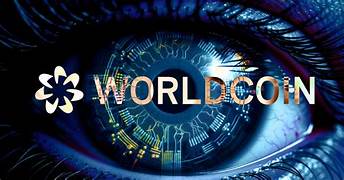Digital Zeitgeist – Worldcoin’s Revolutionary Leap – Merging Cryptocurrency Digital Identity and Global Democracy
OpenAI’s CEO, Sam Altman, in collaboration with his co-founders Alex Blania and Max Novendstern, are revolutionising the spheres of cryptocurrency and digital identity. Their brainchild, Worldcoin (WLD), marks a pioneering venture that intertwines digital identity with financial inclusion. This cryptocurrency initiative has captured the attention of the globe, not merely for its ingenious implementation but also due to the potential societal implications it holds.
The genesis of Worldcoin was in October 2021, aiming to leverage eye scans to generate a unique digital identity. Scans create numbers linked to the user’s identity, with no record of the scan preserved, thus aiding in fraud and theft prevention. The reward for the users who participate? Worldcoin (WLD).
“More than three years ago, we founded Worldcoin with the ambition of creating a new identity and financial network owned by everyone; the rollout begins today,” expressed Balina and Altman in their letter launching WLD. This innovative project has been backed by several VC firms, including Andreessen Horowitz, Coinbase Ventures, 1confirmation, Blockchange, and Day One Ventures, valuing Worldcoin at an impressive $1 billion at its launch in 2021.
Worldcoin functions as a layer-two on the Ethereum blockchain, an ecosystem that became more sophisticated in March with the introduction of the World ID software. This decentralised identity protocol prioritises privacy and enables users to generate their ‘World ID’.
As Worldcoin describes on their website, World ID acts as a global digital passport, “enabling seamless sign-in to websites, mobile apps and crypto dapps, while proving you’re a unique and real person without sharing personal data like names, emails, etc.” Using zero-knowledge proofs, users can assert their uniqueness and authenticity without sharing personal data. This protocol provides users with numerous personhood verification options, such as phone number verification and Orb biometric verification for extreme accuracy. Orb, a custom hardware iris imaging device, is designed by ToolsForHumanity to scan the irises of users to generate their unique identifier.
Worldcoin’s ambition extends beyond the launch of WLD tokens. It aspires to broaden Orb locations to over 35 cities across more than 20 countries, spanning five continents, by the close of 2023.
Further enhancing its offerings, Worldcoin has initiated a waitlist for its ‘World ID’ software development kit (SDK), which will empower websites to verify the humanity and uniqueness of their users without storing personal information. The Worldcoin Foundation subsidiary, World Assets Ltd., is tasked with minting and releasing the Worldcoin token to eligible users. As per Blania, “In the age of AI, the need for proof of personhood is no longer a topic of serious debate; instead, the critical question is whether or not the proof of personhood solutions we have can be privacy-first, decentralised and maximally inclusive.”
If Worldcoin’s mission is successful, it could be a game-changer in terms of increasing economic opportunity, distinguishing humans from AI online, enabling global democratic processes and potentially introducing an AI-funded universal basic income (UBI).
Indeed, the project has already seen a surge in user sign-ups, exceeding 2 million. Altman has revealed his ambition to escalate this to a staggering 2 billion users. On its debut trading day, WLD rose by 33.83%, with its trading price reaching $2.23, a fact confirmed by CoinMarketCap.
However, it is essential to adopt a Devil’s advocate perspective on this seemingly beneficial concept. The use of biometric data, even though securely stored, could raise ethical and privacy concerns. Also, the idea of tying an individual’s identity to their financial status could potentially create unforeseen societal implications. The assurance of the tech’s accuracy is yet to be proven in real-world scenarios, and the question of accessibility across different demographics remains unanswered. Furthermore, the financial inclusion narrative is compelling but will require substantial infrastructure and regulatory support to make the benefits truly universal.
Despite these challenges, the audacious vision of Worldcoin to reshape digital identity and its interlinkage with economic opportunity and democratic processes stands as an intriguing prospect. The initiative certainly has the potential to revolutionise the world of cryptocurrencies and digital identity. Only time will tell whether it can deliver on its grand promise and live up to its billion-dollar valuation.
Disclaimer: The views and opinions expressed in this article are those of the author and do not necessarily reflect the official policy or position of GPM-Invest or any other organisations mentioned. The information provided is based on contemporary sourced digital content and does not constitute financial or investment advice. Readers are encouraged to conduct further research and analysis before making any investment decisions.

